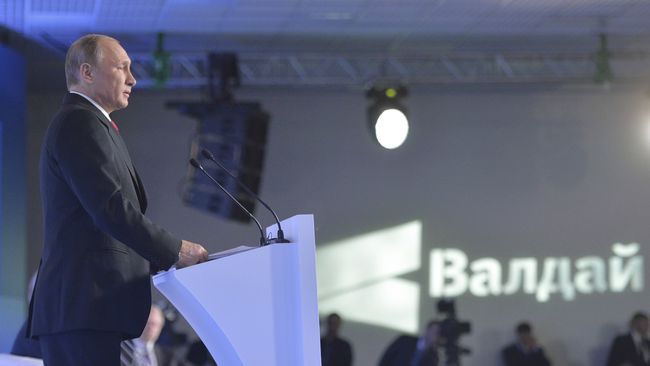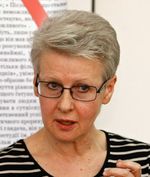Street-style diplomacy
Putin’s speech at the Valdai Club’s meeting shows that economic, financial, and military situation is not developing as planned
As usual, Russian President Vladimir Putin took part in the meeting of the Valdai International Debating Club. It was created in 2004 by the news agency RIA Novosti, when it was entrusted with promoting the interests and image of Russia in the global information space. In early 2014, the duty to organize the Valdai Club was transferred to a specially created Valdai Foundation, the Higher School of Economics, and Moscow State Institute of Foreign Relations. The hotel where Putin spoke had been built to host G-8 meetings. Since Russia was expelled from G-8 after the annexation of Crimea and the Donbas aggression, the hotel has been hosting meetings of the Valdai Club for a second year.
This forum once gathered quite prominent politicians, often including serving ministers and people who influenced political decision-making in their countries.
The participants’ composition has substantially changed or even diminished in stature. Serving politicians and high-ranking officials from Western nations now avoid coming to Russia and participating in such discussions.
One of the participants spoke rather sharply about the participants’ composition. “Most forum participants were, frankly, not very happy with the choice of panellists for the session with Putin. For example, Jack Matlock [US Ambassador to the Soviet Union in 1987-1991. – Ed.] is a good diplomat, but he has retired from active politics and does not affect the decision-making in Washington.” The same is said about former Czech president Vaclav Klaus.
In other words, some participants believe that even in such a difficult period for Russia’s relations with the Western world, it had to make more effort to attract not only scholars and retired politicians, but also those who can really influence the decisions of the governments of the West. Thus, the meeting with Putin would have been not only an exchange of speeches, but also a way to provide a framework for future practical steps.
In fact, serving Western politicians’ unwillingness to come to Russia is not surprising. They have no special desire to listen to the rhetoric of the Russian president and his stories of Russia’s good intentions and willingness to save the world from the terrorist threat. All this can be easily found in the Russian press or the federal TV channels.
Putin continues with his hooligan-style diplomacy. A strong desire to show off his street cred is painfully obvious. “Back 50 years ago, Leningrad streets taught me one rule: if a fight is inevitable, one must strike first.” He demonstrates that style in international relations. Just as in Soviet propaganda, it is opponents who are blamed for that.
Characteristically, the forum participants were not expecting anything sensational from Putin’s appearance. Professor of the European University in St. Petersburg Alexei Miller predicted: “I do not think we will hear something sensational today from President Putin. I think he would rather quickly identify the points where he is ready to ‘meet’ Western partners if they want to switch to the cooperation mode, especially on Syria.” The professor was right. We heard nothing new except the usual rhetoric, which was mostly targeting domestic audience rather than external one.
Although Putin’s somewhat bellicose speech was intended to be a show of Russia’s strength and steadfastness and firm policies, there was a persistent impression that the Kremlin was beginning to realize the impasse in which it had brought itself.
After a showy launch of missiles from the Caspian Sea on targets in Syria and the Russian propaganda machine’s slavish praise of it, Putin’s inner circle was sobered by NATO seaborne missile defense exercises in the northern Atlantic. It turned out that Russian cruise missiles were not that dangerous after all. Western militaries have quite adequate intercept and destruction weapons. That is why the Russian leader discussed in minute detail alleged threats to his country, caused by the existing deployment of US missile defense in Romania, which should come to Poland as well in the near future.
Seemingly, it should not be an issue at all. Missile defense system is by definition defensive, why then the Kremlin is so concerned about its deployment? Putin answered at once: “Nuclear deterrent is losing its value. Some might even entertain the illusion that a real victory of one party to a global conflict is again attainable, without irreversible unacceptable consequences, as the experts say, for the winner, if there would be one at all.”
This is where the root of the Kremlin’s fears lies. Despite the showy launch of missiles at Syrian targets, specialists know well that the Russian military is technically and technologically seriously lagging behind the West, particularly the US, and the gap is increasing. The Kremlin’s real trump card is its nuclear weapons. Putin and his inner circle are afraid of losing that last trump in their game with the West, especially Washington.
Of course, he used the opportunity to make a few quite primitive reminders to European countries of their alleged dependence on the US instead of an alliance of equals. When doing so, Putin pulled facts and figures out of context, just like in Soviet propaganda. “Look, just last year a French bank was fined almost nine billion dollars – 8.9, if I am not mistaken. Toyota paid 1.2 billion dollars, the German Commerzbank settled out of court to pay 1.7 billion dollars to the US and so on.” In fact, these payments were made not only because of violations of the sanctions, but also for other reasons.
Time is working against Russia in Syria. Military analyst Ruslan Pukhov raised the question of the possible transfer of American MANPADS to Syrian opposition. “…There are our pilots there, and they can die...” As they say, the people are concerned, so the answer was appropriate. “As far as we know, the US military are already transferring anti-tank systems and training teams to operate them. I think this is a big mistake, since these weapons will definitely fall into the hands of the opposition. Now the Americans have started airdropping weapons and ammunition. Who will get all this? Obviously, the end users will be the ISIS and An-Nusra. Regarding the transfer of MANPADS, I hope this has not happened, that the US leaders are sane people, and they understand that the weapons could end up in the hands of terrorists. It can be turned, in particular, against American pilots. This understanding has to prevent such transfers, I hope so.”
So, what does the Russian leadership know? Are Americans transferring MANPADS to the Syrian opposition or not? The same answer has two contradictory intentions. So far, we know that such a request from the Kurds was denied. The Kurds certainly would not transfer such weapons to anyone. However, the Kremlin’s concern is obvious. After all, if body bags start coming from Syria, it is likely that some Russians at least will care about it.
Realizing that the Syrian adventure will not bring a victory, the Kremlin began to show a constructive approach. For some time already, the higher Russian officials are trying to convince all that Russia fights not for Bashar al-Assad, but for the future peace settlement in Syria. Thus, the Russian client in Damascus will obediently go when Russia and Iran will agree on that. In other words, the Syrian president’s recent hasty visit to Moscow was to demonstrate that this person, unacceptable for the opposition and so the main obstacle for starting a political settlement, can be removed.
All this happened on the eve of the meeting of foreign ministers of Russia, the US, Turkey, and Saudi Arabia on Syria. The Kremlin’s stated position is to prevent the collapse of Syria, including by armed force, and ensure the formation of a transitional government involving supporters of Assad. Further developments are open for negotiations, but the ISIS terrorists and their supporters must be removed from Syria. One has to wonder, where?
It is obvious that the stated aim, the destruction of the terrorists in Syria, is unattainable. Thus, the beginning of the political process can be viewed as Putin’s retreat. It may be accompanied by a loud propaganda campaign, but retreat all the same, both military and political.
Although Syria has occupied a prominent place on the forum, it could not help but touch upon the issue of Ukraine as well. The Russian position has not changed here. They keep declaring that there is no alternative to the Minsk process, but it is combined with a reluctance to make real steps for its implementation. As always, they put all the blame on the government of Ukraine and repeat the previous demands that it negotiate with “representatives of the Donbas.”
The Kremlin’s attempt to exchange Syria for Ukraine has failed, so it is time for the next step. They have failed to obtain everything they wanted in the Middle East, and the situation in Ukraine is similar, so we see an attempt at a limited exchange, not all for all, but part to part.
Signs of a possible success of the new Russian tactics are there. On the eve of talks on Syria, President Barack Obama vetoed the budget bill over appropriations to supply Ukraine with lethal weapons. It was clearly an attempt of the so-called Washington doves to avoid irritating the Kremlin hawk once again.
A series of statements by Russian leaders and Putin’s speech at the Valdai Club’s meeting show that economic, financial, and military situation is not developing as planned. They are thus starting a painful search for the exit, trying to do it on the cheap. Judging from the past, this attempt is unlikely to succeed. Therefore, the easiest way out is to begin preparations for Russia’s comprehensive retreat from Syria and Ukraine. It will immediately make life easier, for Russia itself and its neighbors alike.
Voice from FACEBOOK
 Lilia SHEVTSOVA, Senior Researcher at the Brookings Institution:
Lilia SHEVTSOVA, Senior Researcher at the Brookings Institution:
“The Valdai Forum. Putin once again explains the world to international experts (who apparently have not yet understood who they are dealing with).
‘Putin proposed a controversial picture: how is one to negotiate with America if Americans are to blame for everything?’ – a participant asked. He will have to come to dinner with Putin again, then. Obviously, it is difficult for a Westerner to understand the Kremlin’s idea of a world order based on the idea of ‘one must strike first!’ Even so, it is such a world that Putin wants us to live in. Everything is relative in that world: the aggressor can be a mediator in finding a solution to the war unleashed by himself; violator of international treaties can be an initiator of new coalitions. In that world, the balance of power is not based on one’s strength, but rather on readiness to play without rules. This is the world of the weak who cannot afford to admit weakness, and of those who are willing to blackmail others who are strong of arm, but faint of heart and willing to trade in their pragmatism. This is a world of cognitive dissonance, which is hardly healthy state for one’s mind. Let us see how Western colleagues will ‘conceptualize’ the Valdai brew. It will be even interesting...”






